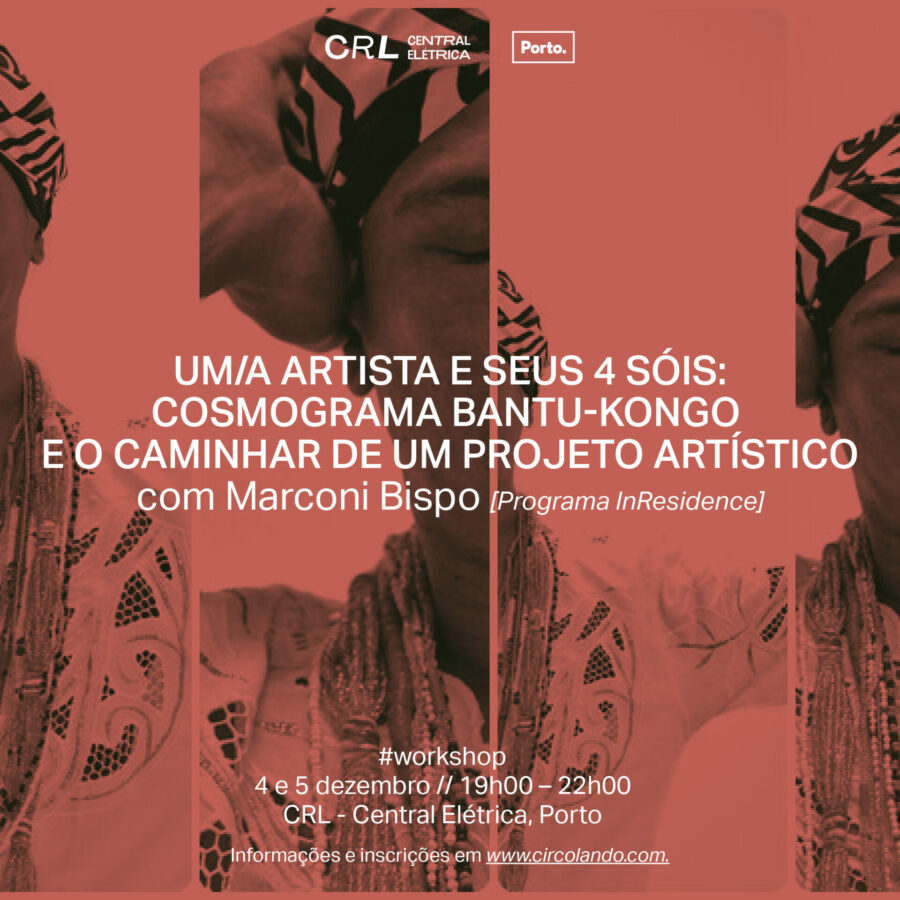AN ARTIST AND HIS/HER 4 SUNS | 4 & 5 December, CRL – Central Elétrica, Porto
AN ARTIST AND HIS/HER 4 SUNS: BANTU-KONGO COSMOGRAM AND THE JOURNEY OF AN ARTISTIC PROJECT | Workshop with Marconi Bispo [InResidence Program]
4 & 5 December 2024 | CRL – Central Elétrica, Porto
The Bantu-Kongo Cosmogram can be understood, preliminarily, as a graphic synthesis created by the Bantu people to provide an understanding of the formation and movement of the Universe and its implications for the dynamics of what is visible and what we cannot see. Known as the dikenga, this Cosmogram presents us with the intricate wisdom of a region of the African continent. Over these two days, we aim to connect this knowledge with our artistic practice, expanding and deepening elements such as emerging and recording creative ideas, recognizing and nurturing their potential, creating, experimenting, selecting and exploring possible paths to “complete” these creations.
This journey will be guided by Marconi Bispo, a performing artist and Candomblé priest. In addition to his 29 years of cultural production, he will weave together the knowledge developed for the play Ayiti, a Montanha que Assombrou o Mundo as part of the InResidence program, at Central Elétrica, Porto.
Inspired by the movement of the Sun – the foundation of the Bantu-Kongo Cosmogram – the workshop will take us on a theoretical and practical journey to receive creative gestures within our bodies. From there, we will engage in experiments, annotations, recordings, and sharing these ideas in a collaborative, communal space of attentive speaking and listening, following the traditions of African and Indigenous cultures.
Marconi Bispo
In June 2024, Marconi Bispo completed 29 years of professional activity in the performing arts, having worked with important companies and directors in the state of Pernambuco. His resume boasts 45 theatrical productions in which he has performed as an actor, singer, dancer, puppeteer, playwright, and director. He has conducted research on racial relations in Pernambuco and Bahia, with a deep interest in constructing gender markers within African and Indigenous-based religions and exploring the challenges of discussing mixed-race identity in a country like Brazil.
He’s an initiated priest of Ìyémọjá and Ọbàlùfọ̀n (since 2004) and Ọ̀rúnmìlà Bàbá Ifá (since 2023), and has connections to the Jurema Sagrada, an Indigenous-based spiritual tradition practiced in some northeastern Brazilian states.
From 2016 to 2020, he starred in the autobiographical play “Luzir é Negro!”, performed by Teatro de Fronteira, a group he joined in 2014. During his time with the collective, he participated in 11 productions, acting, directing audiovisual projects, writing plays, and teaching courses. On April 22, 2022, he premiered the play “re_Luzir”, marking the beginning of independent projects rooted in crafting performances where his Afrographic crossroads are both journey and performance (he acted, produced, and signed as Director and Playwright).
For the past two years, he has led the project “Ọ̀nà Dúdú – Caminhos Negros do Bairro do Recife” (“Ọ̀nà Dúdú – Black Paths of Recife’s Neighborhood”), a historical-performance tour that reveals and delves into the Black heritage of the area where the city began.
Raised in a family of Candomblé practitioners and familiar with sacred Afro-Brazilian spaces from an early age, Marconi Bispo seeks to harmonize his academic background (he holds a degree in Theater) with the African and Indigenous spirituality to which he is devoted.


